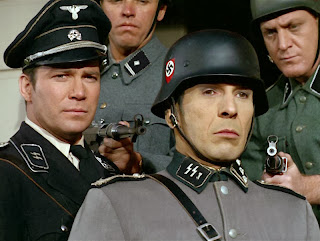When I first began this A-Z
of Afrika Reich I meant to publish an
entry a week with the last, ‘V is for...’, going live as the UK paperback was
published. As with the writing of Book 2, this schedule now seems rather
optimistic. But as the A-Z draws to an end I thought it was a good opportunity
to reflect on it.
In the two and a half years
I’ve been writing this blog, more than 32 500 people have visited it; I hope
some of them have read it and been intrigued and entertained by the contents.
It has certainly been a revealing process for myself. I’ve learnt as much about
the book dissecting it here as I did while writing, perhaps more. At the same
time, trying to get a handle on it has been like sculpting steam: for every
assertion I make, I’m immediately aware of several contradictions. I like to
think, however, that I’ve shown that Afrika
Reich is more than just Fatherland
or SS-GB in the tropics.
The comparison with those
books has been both a boon and a curse. The great advantage was that it created
an association with existing bestsellers. Against that, I never saw Afrika Reich as being of the same ilk. A
naturalism has crept into novels imagining a victorious Nazi Germany, something
borne through SS-GB and Fatherland and continuing to this day
with the recent Dominion. I wanted to
move away from that, though the demands of marketing departments meant I often
had to play to the gallery and define myself in terms of Deighton, Harris et al
(not that they’re bad company to keep!).
Why the naturalism? It may
partly reflect a general movement in fiction. I think it also comes from a
sense that if an author captures certain details then he is accurately
portraying what the world would have been like if Hitler had won. I remain
unconvinced. The whole point of an alternative history is that we can never
know what it would have been like. A more fantastical approach served earlier
examples of the genre well, such as Swastika
Night, The City on the Edge of
Forever (for all the Star Trek
fans I know who read this blog) and The
Man in the High Castle. By tendency, I’m more comfortable in this camp.
This blog has allowed me to
convey a sense of that and speak my mind more openly than the marketeers
probably want me to. If you’ve read this far you’re in a better place to
understand my intentions (yes, that word again); it’s something I plan to
continue more explicitly in Book 2 – the subject of my next entry and the last
in the series. While I leave you to speculate what the V can stand for, here’s
the addendum in advance...
V is also for Violence
Along with the literal
brigade (see ‘L is also for...’) the reaction that most surprised me about the
book was how violent people found it. Obviously given its setting and subject
it was never going to be a fluffy, rose-perfumed narrative, despite that I
never felt the violence was as bad as some people protested. I’ve had grown men
tell me they had to stop reading because they found it excessive. What this
says about me I don’t know – though others have speculated (see here, for
example).
All I can say is: 1) I
didn’t want to shy away from the violence that was the reality of the Third
Reich and continues to this day in central Africa; nevertheless I always
perceived mine as a stylised, almost comic violence, not to be taken entirely
seriously 2) before submitting the book for publication I made a conscious
decision to tone things down. If you think the version that ended up in the
shops is bad, you should see the earlier drafts!


